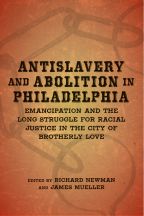
288 pages / 6.00 x 9.00 inches / no illustrations
Social Studies / Slavery Studies
Antislavery and Abolition in Philadelphia considers the cultural, political, and religious contexts shaping the long struggle against racial injustice in one of early America’s most important cities. Comprised of nine scholarly essays by a distinguished group of historians, the volume recounts the antislavery movement in Philadelphia from its marginalized status during the colonial era to its rise during the Civil War.
Richard S. Newman is Professor of History at the Rochester Institute of Technology and author of Freedom's Prophet: Bishop Richard Allen, The AME Church and the Black Founding Fathers and The Transformation of American Abolitionism: Fighting Slavery In the Early Republic.
James Mueller recently retired as the Chief Historian at the Independence Hall National Historic Park in Philadelphia.“This collection offers a scholarly panoply that mirrors the diversity of the antislavery community depicted in the book....Today's readers, the editors' hope, can use their volume similarly to rediscover 'the meaning of Philadelphia's abolitionist past' (14). They will not be disappointed.”—Corey M. Brooks, Civil War History
“Richard Newman and James Mueller have assembled a collection of original essays from leading scholars that delivers a series of sharp images of what integration actually did look like when black and white Philadelphians engaged one another in action and discourse over more than a century.”—Scott Hancock, H-Law
“The collection is very tightly focused, the essays are well written, and the information is useful to anyone interested in abolition.”—Beverly Tomek, Pennsylvania History
Found an Error? Tell us about it.